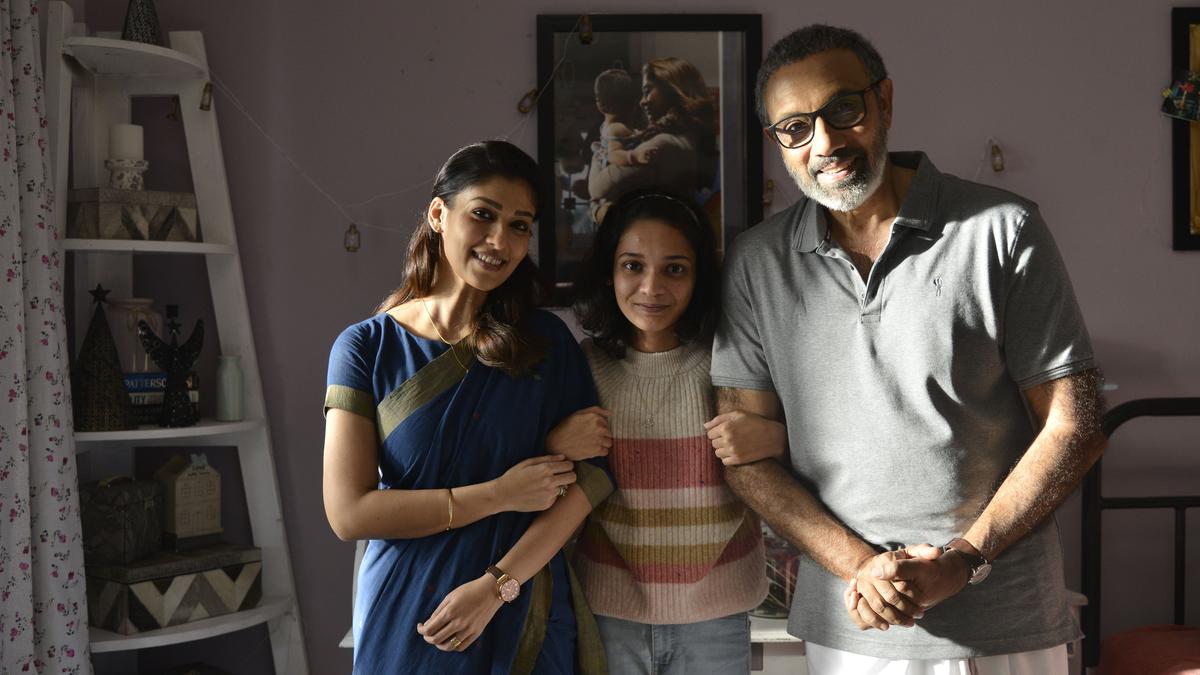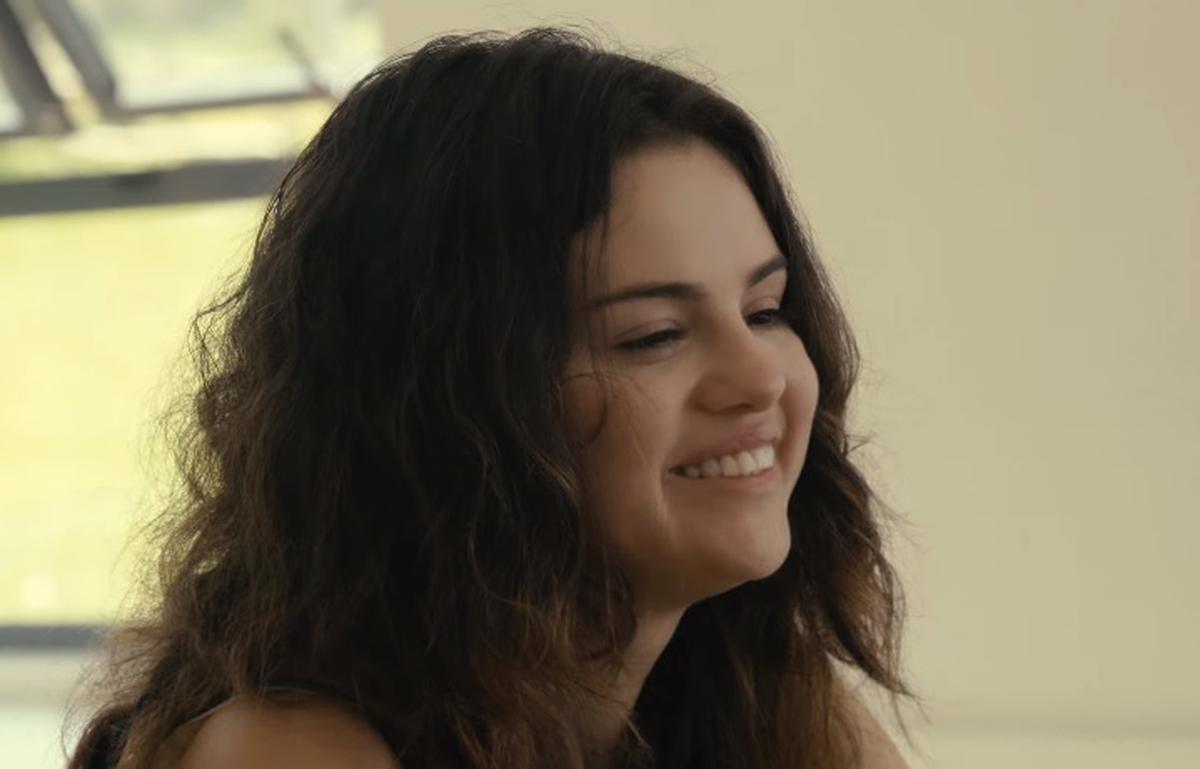Nayanthara and Sathyaraj in Tamil movie ‘Connect’
| Photo Credit: Special Arrangement
In the midst of crashing sounds of the waves comes a breezy hum of a teenage girl. She sings ‘Naan Varaigira Vaanam’:
Meen kannadi thottikul thedum oar kadale vazhva? (A fish searching for the ocean inside an aquarium…is that life?)
Then comes this beautiful line: Nagargira nadhigal dhane kadalai thodum kanne kanne (A river that moves on is the one that meets the sea); virindhirum siragugal vinnai thodum nenje nenje (A bird that spreads its wings reaches the sky).
Weren’t we all like fish inside the aquarium searching for life during the pandemic-induced lockdowns? Isn’t this song about humanity, that kept us all going, when hope was lost at the onslaught of COVID-19? All of this seems like a distant past. But we are not over yet. And these two lines by Kadhirmozhi Sudha help us guess the soul of this movie.
The “meen” of Connect is Anna Joseph (Haniya Nafisa). She gets an opportunity to pursue her passion for music from Trinity College of Music, London. Anna’s mother Susan (Nayanthara) is against it and glares at the grandfather, Arthur Samuel (Sathyaraj), to be on her team. The person who asks Anna to grow wings is her father, Joseph Benoy (Vinay Rai).
Joseph is a doctor who is on COVID duty. He does not, however, miss to video call Anna and Susan no matter how hectic his day is at the hospital. Ashwin cuts to the chase in the initial portions. The scene cuts and we see Joseph lying on the bed with an oxygen mask on. Joseph dies, just like countless COVID warriors who sacrificed their lives for us to breathe. Grieving over the loss of her father, Anna Joseph tries to communicate with him through the ouija board, when she invites an uninvited guest. This is when the title card appears, at the 20-minute mark.
Connect
Cast: Nayanthara, Sathyaraj, Anupam Kher and Haniya Nafisa
Director: Ashwin Saravanan
Storyline: Grieving over the loss of her father, Anna Joseph tries to communicate with him through the ouija board, when she invites an uninvited guest.
Very few movies set against the backdrop of COVID-19 have come close to capturing the restlessness and uncertainty we have felt over the last couple of years. Filmmaker Ashwin Saravanan and writer Kavya Ramkumar are smart enough to design Connect in the thick of the pandemic as a means to take us through the time we all felt suffocated and claustrophobic, living our lives inside the four corners of a smartphone camera. This is the most horrifying part of Connect; the fact that the camera’s gaze is the front-facing camera of a smartphone for the most part.
Don’t get me wrong. The movie is not shot on a smartphone. It’s just that the smartphone camera’s gaze acts as the primary camera with which we see the drama unfolding. For a horror movie, the possibilities are endless. This is a brilliant move by the filmmaker. Because the characters use smartphones to communicate with each other and to show what’s happening in the house, we get a feeling that Connect is downloading right in front of our eyes. Another brilliant move is to do away with the intermission (its runtime is 99 minutes). Which makes the buffering seamless.
Connect can get really scary at times and there are at least two terrific jumpscares. There is nothing more terrifying than the screen starting to buffer at the most tense moments, as if to tease the audience. You scream at this idea, when a message pops up on the screen with this message: “You are the host now.” As a work of horror, Connect offers a giddy experience in parts. But then, that is not just it.
About an hour into the movie, you feel a disconnect when you realise that Connect is a movie that places its trust on the theatrics of the genre and not on emotion. Allow me to explain: a daughter’s grief over her dead father is an emotion. Great. But what has that got to do with Satan?
Time and again, filmmakers keep making the same mistake: when your protagonist isn’t directly affected by the circumstances they are put in, which in turn affects us the audience, you become indifferent to the emotions. In Connect, Ammu is affected by the loss of her father. And for a large part of the movie, we are only invested in the father-daughter emotion.
There is a beautiful scene where someone is thanking Joseph for all the services at the hospital. In the same movie, I would have liked Ashwin to conjure up something that involves the father, Joseph. Like, for instance, Ammu is possessed by all the lives her father failed to save. And the daughter is paying the price for her father’s “sins”. Something like The Killing of a Sacred Deer. Something where Ammu is directly affected — like Swapna in Ashwin’s masterful Game Over. Cause and effect.
But when you introduce a third party like Satan into the movie — with Anupam Kher’s cameo as an exorcist — it becomes yet another horror movie albeit a little more engaging. That is still okay. But a basic movie is not something you would expect from Ashwin.
At a time when filmmakers are chasing after formula, it looks like Ashwin is chasing after excellence. He wants to be known as a genre filmmaker. Connect is his third movie in the horror trilogy. For someone whose resume includes the stunning Game Over, you would ideally expect Ashwin to push the genre constraints. Connect is him settling for the ordinary.
Connect releases in theatres on December 22





